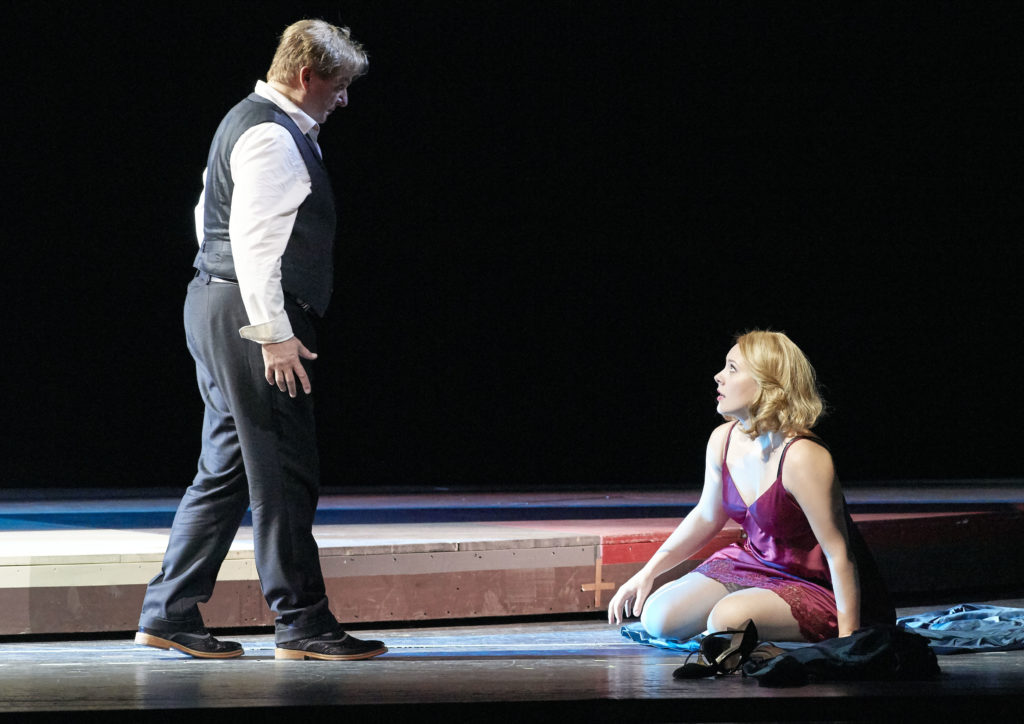 In Vienna State Opera’s new production (Karoline Gruber), the set looks like one of Trump’s palaces- 1930’s pomp, all black and gold, but smashed up: there’s a huge frame at the back of the stage, the glass in fragments. Objects lie around- symbols of whatever – resembling a Salvador Dali painting. Foremost is the funfair merry-go-round, and the playground horse: representing the wheel of fortune, a carousel whose bright lights offer the illusion of happiness.
In Vienna State Opera’s new production (Karoline Gruber), the set looks like one of Trump’s palaces- 1930’s pomp, all black and gold, but smashed up: there’s a huge frame at the back of the stage, the glass in fragments. Objects lie around- symbols of whatever – resembling a Salvador Dali painting. Foremost is the funfair merry-go-round, and the playground horse: representing the wheel of fortune, a carousel whose bright lights offer the illusion of happiness.
How can Alexei (Misha Didyk) explain to Polina, his passion, that he’s lost all the money she asked him to gamble with? (Actually, she’s in debt to the Marquis, her former lover.) And she’s the step-daughter of the General, another heavily-indebted gambler. The General (tremendous Russian bass Dmitry Ulyanov), reads a telegram, and sings his grandmother is not well at all. He’s madly in love with the scheming , but penniless, Blanche, his floozy, Elena Maximova, wearing a shimmering white roaring-twenties creation with tassels. He’s hoping to inherit to marry her. And he’s also deeply in debt to the Marquis (Thomas Ebenstein), who runs an extortion racket, enforced by mobsters.
So in this aristocratic, rich-man’s world of bling, all isn’t what it seems. And although Prokofiev composed his opera in 1917 – the year of the Russian Revolution- red-jacketed waiters polish the marble-effect floor like serfs. One is on his knees, a bucket on his back, in a frozen pose like a street performer.
Yes! This is supposed to be (in Dostoyevsky’s novella) mid-19th Century Germany: Roulettenberg, the pun intended!
Didyk’s Alexei is black-suited, white-shirted- he’s meant to be a tutor, so the General berates him, he should have his wits about him and not play roulette. Didyk’s magnificent tenor voices Dostoyevsky’s deeply mystical vision: singing of a nightmare of six generations of debts passed on from father to son.
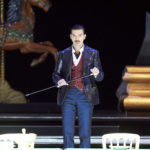 Seated on a gold bullet blown up to surrealistic proportions, Ebenstein, the Marquis, dressed like a gangster, in black jacket, brocaded waistcoat, and jeans, metes out credit to a long line of 1920s partygoers, and fashionistas – his enforcers in black-shirts.
Seated on a gold bullet blown up to surrealistic proportions, Ebenstein, the Marquis, dressed like a gangster, in black jacket, brocaded waistcoat, and jeans, metes out credit to a long line of 1920s partygoers, and fashionistas – his enforcers in black-shirts.
By contrast, Didyk’s Alexei embodies Dostoyevsky’s Russian soul. In one of a number of soliloquies as arias he sings, he doesn’t know what’s happening to himself, or in Russia. The poet, he is indifferent to everybody else. And enigmatically, Hamlet-like, ‘You probably didn’t have a good heart, but the mind is irrational.’
In her Act 1 aria, Polina, Elena Guseva , a lyrical soprano with a powerful upper range- another magnificent Russian soprano- challenges Alexei: so you want to buy me with your money. She plays with the love-obsessed Alexei. No, it’s difficult to explain, he sings; he sits in his garret and muses. But led on by her, in his desire, he could devour her. Guseva, with her mousy blonde hair, wearing a navy silk gown, does, indeed look gorgeous. He sings, he’s burning with fever: but he knows it’s just impossible. She sits coldly. (Why should she force him to do that? No use to her.) Prokofiev’s music is spiky, brass and wind players bristling.
A glimpse of the Marquis’s strong-arm ‘debt collectors’: The General, in his gold-braided uniform, is still at the mercy of these spivs, one of them marking him with a pistol.
Then- in another episode- Polina, playing on Alexei’s devotion to her, orders him to offend the Baron and his wife. Who is that woman, the Baroness, to eye him like that! Polina, the paragon of 1920s cool indifference, just wants to have a laugh. 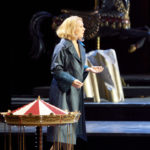 Prokofiev’s music pointing up the subversive mood, veers from harsh metallic dissonance to lush romanticism. Didyk removes his shirt – waving it over his head like a soccer fan – baring his muscular chest.
Prokofiev’s music pointing up the subversive mood, veers from harsh metallic dissonance to lush romanticism. Didyk removes his shirt – waving it over his head like a soccer fan – baring his muscular chest.
Opening Act 2, the stage is dominated by a long banqueting table, but it’s covered in green felt like a gaming-table. The star turn is provided by Babulenka, the marvellous Linda Watson, in a white wig, who announces she would rather gamble away her fortune than bequeath it to anyone else. (And she seeks Alexei’s help.)
The General, Ulyanov in white, wearing black boots, soaked in vodka, slumped in his armchair, rails at his lost inheritance. He wanted to stop her; she waved her cane at him. She’d already lost 40,000; it was an insult to a gentleman.
The set is now a revolving stage of half-opened black doors, with enclaves of debtors: a gambler’s purgatory. There’s a message from the General to Alexei not to destroy him. And the General is warned by the Marquis of a bill outstanding: business is not doing well.
Alexei sings there’s nothing to be done. Such a mess: what will become of them. Didyk’s is a wonderfully expressive tenor. Oh, Polina, why are you shouting my name like that? Where is the Marquis- the rogue, he sings – now realising he has a hold on Polina.
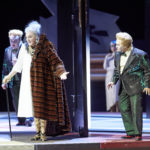 Good day, my dear Alexei. Please put up with an old woman. Linda Watson’s Babulenka, frail-looking, is trailing a fur-like coat, which someone greedily tugs away. They- grotesque figures in glitter jackets- pull off her jewellery; sold to others behind the scenes, ‘fences’, or pawnbrokers. Please forgive an old fool; she bids them well. She will build a church. Down to her nightdress, they even rob her of her sticks as she exits.
Good day, my dear Alexei. Please put up with an old woman. Linda Watson’s Babulenka, frail-looking, is trailing a fur-like coat, which someone greedily tugs away. They- grotesque figures in glitter jackets- pull off her jewellery; sold to others behind the scenes, ‘fences’, or pawnbrokers. Please forgive an old fool; she bids them well. She will build a church. Down to her nightdress, they even rob her of her sticks as she exits.
She’s defamed the nobility, it’s all gone, moans the General. Meanwhile Blanche leaves him the day before the wedding. We see her, Maximova, dancing off the stage with a slick Latino, brilliantined hair and Valentino moustache. Ulyanov’s brutalised figure seems to choke to death with rage, collapsed in his chair.
(Opening Act 4) Didyk is sitting alone on the edge of the stage. Guseva’s Polina grabs him and pulls him to her in a passionate kiss. And she begins to strip. She sings of a letter from the Marquis- forced to leave immediately- having lost all his loans to the General. He will now waive the 50,000 she owes him. Now she has the chance of a new life. That rogue! How she’d love to throw the money in his face! She kneels, coaxing Didyk seductively. But he leaves (convinced that, with her money, he will win, and her too.)
Prokofiev’s score has a rhythmical momentum- a train of Fate inexorably moving forward. Now the stage is a fairground roundabout. The gamblers, party animals, throw up gold dust – coins from heaven- in a remarkably choreographed scene (Stella Zannou). Rien ne va plus. They are gamblers, obsessed, addicted. (One sings he’d lost everything on red.) The stage is showered in gold dust. Croupiers wear glittering emerald jackets The table is now closed. Alexei has won 60,000. He broke the bank twice. What a man!
Alexei, by himself, Didyk appears disfigured; he’s kind and good-natured, but keeps challenging his luck, one sings. The gamblers wear carnivalesque masks- their grotesque appearance reflects their inner torture. Clever staging, but all too extreme. Nevertheless, a tour-de-force of choreographed spectacle.
Didyk is standing triumphantly on the gaming table. He reaches up to heaven; goes berserk , (like you would if you won the lottery.) ‘Insane luck’ he sings, staggering like a cripple. Polina can’t accept his money.
In the powerfully enacted closing scene, Didyk sings he’s offering her his life. He’s paying a high price- 50 thousand: the Marquis’ mistresses cost less! Now she deserts him: he’s like the Marquis, just like him. But do you love me, she pleads. It’s always been hers, he insists. Then she throws it back. Take your money! He’s been corrupted, fallen for ‘a far more capricious mistress.’
The staging (Roy Spahn) was bizarre, a concept misunderstood, incomprehensible to all but Gruber. But what a cast, the leads, Russian and outstanding, Vienna State Opera orchestra excelling under Young’s baton. Prokofiev’s opera -he composed the libretto- is a revelation. The operas, too rarely heard, contain some of his finest music.© PR.20.10.2017
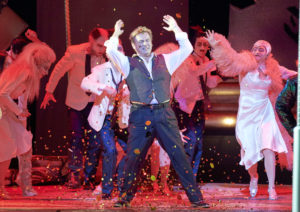
Photos: Misha Didyk as Alexei, Elena Guseva as Polina; Thomas Ebenstein (Marquis); Elena Guseva (Polina); Linda Watson (Babulenka); Misha Didyk (Alexei); Featured image: Misha Didyk
© Wiener Staatsoper/ Michael Pöhn
viennaoperareview.com
Vienna's English opera blog
